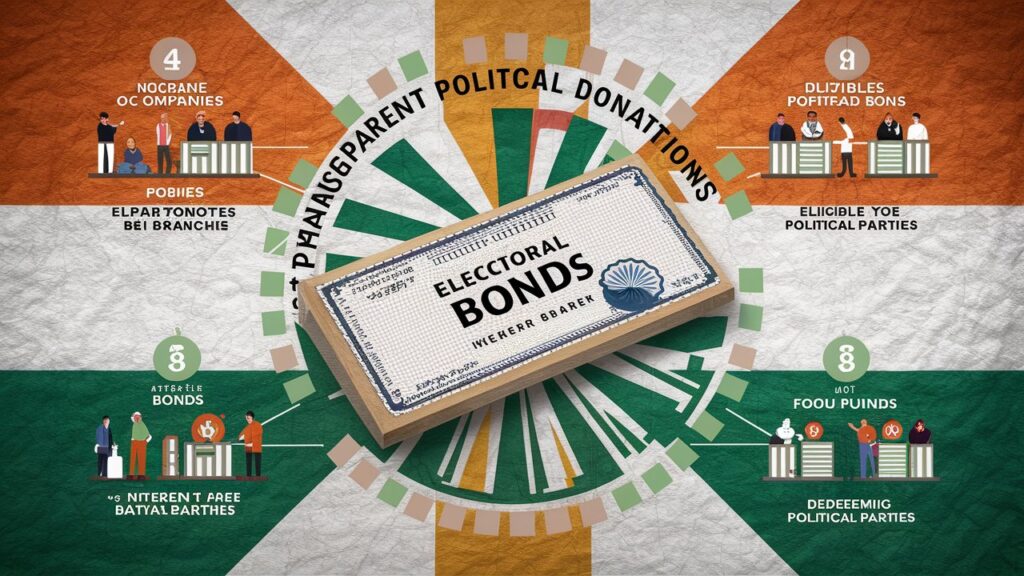What are Electoral Bonds
Electoral bonds are financial instruments introduced in India to allow for transparent political donations. They are interest-free bearer bonds that individuals and companies can purchase from authorized branches of the State Bank of India (SBI). These bonds can then be donated to any eligible political party, which can redeem them for funds.

History of Electoral Bonds in India
- Introduction: The electoral bond scheme was introduced in 2017 as part of the Finance Bill. It was aimed at ensuring transparency in political funding by allowing donations through banks and keeping donors anonymous.
- Usage: Electoral bonds were sold in multiples of Rs 1,000, Rs 10,000, Rs 1 lakh, Rs 10 lakh, and Rs 1 crore during specified periods throughout the year. Political parties registered with the Election Commission and securing at least 1% of the votes in the last general election were eligible to receive donations through these bonds.
Here’s how Electoral Bonds operate
- Purchase: Electoral bonds can be bought in denominations ranging from Rs 1,000 to Rs 1 crore during specific periods of the year.
- Donation: The purchaser can then donate the bond to a registered political party of their choice.
- Redemption: The political party redeems the bond through a designated bank account within 15 days of receipt.

Impact on Indian Election System
- Transparency and Anonymity: While the scheme was intended to clean up political donations, it faced criticism for allowing anonymity, which could lead to a lack of transparency about the sources of political funding.
- Corporate Donations: The scheme allowed for unlimited corporate donations, which raised concerns about corporate influence on politics and policy-making.
The opinions on electoral bonds in India have varied among different political parties:
- Ruling Party (BJP): The Bharatiya Janata Party, which has been the largest beneficiary of electoral bonds, has supported the scheme as a measure to ensure transparency in political funding.
- Opposition Parties: Many opposition parties, including the Indian National Congress and the Communist Party of India (Marxist), have criticized the electoral bond scheme. They argue that it lacks transparency since the donor’s identity is kept anonymous, which could lead to undisclosed corporate influence and potential corruption.
- Civil Society and Election Watchdogs: Organizations like the Association for Democratic Reforms (ADR) have opposed the scheme, stating that it undermines the transparency of political financing and the right to information of the citizens.
Supreme Court’s Decision
The Supreme Court of India declared the electoral bond scheme unconstitutional in February 2024. The Court found that the non-disclosure of donor information was violative of the right to information of citizens under Article 19(1)(a) of the Constitution. Additionally, the amendments introduced by the Finance Act 2017, which permitted unlimited corporate funding of political parties, were deemed arbitrary and violative of Article 14.
The Court’s decision was based on the principle that transparency in political funding is crucial for a healthy democracy, and voters have a right to know the sources of political parties’ funding. The ruling aimed to ensure that citizens are informed about who funds political parties, which is essential for exercising their voting rights effectively. The ban on electoral bonds is expected to bring significant changes to the political funding landscape in India.
This ruling has been welcomed by opposition parties and civil society organizations as a victory for democracy, while the ruling party has expressed disappointment, predicting intense debate and potential changes in the political funding landscape of India
Explore our Categories for more articles